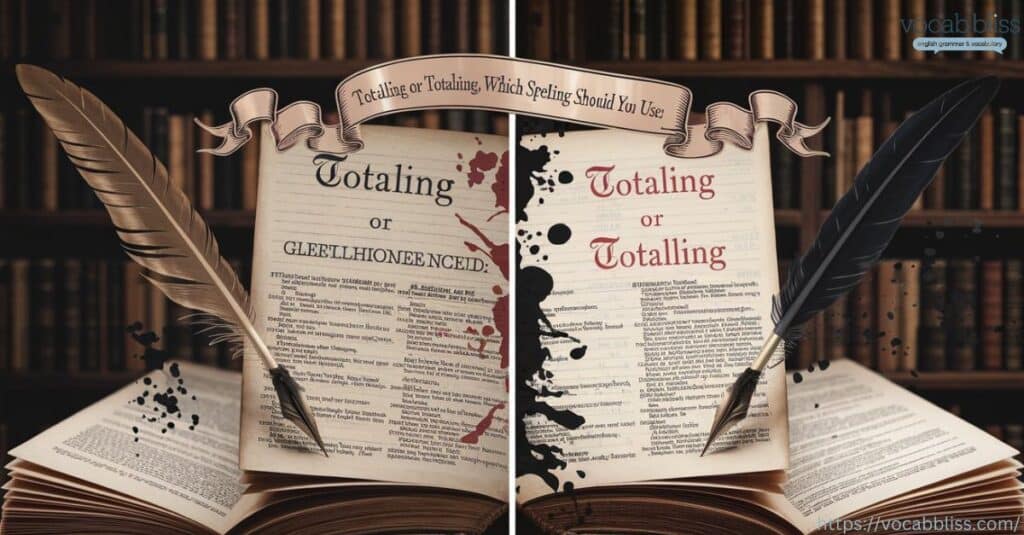In written English, certain words seem to have “twins” – two different spellings, often representing the same meaning. The difference typically lies in regional language preferences, particularly between British English and American English. One such pair that often trips up even experienced writers is “totalling or totaling.”
Which one is correct? The answer depends on where you’re writing or who your audience is. This guide will delve deeply into the spelling differences between “totalling” and “totaling,” exploring their origins, usage in sentences, grammatical nuances, and much more. Whether you’re an accountant, a writer, or simply a curious reader, this article will clarify which form to use and when.
Introduction to “Totaling or Totalling”
The English verb “total” means to add up, calculate, or reach a final amount. In various contexts – from bookkeeping to budgeting – totaling amounts is essential for accurate financial reporting, project estimation, and professional writing.
However, when transforming total into a continuous action (the present participle form), we face a choice: “totalling” (with a double “l”) or “totaling” (with a single “l”). This distinction stems from regional spelling conventions. British English traditionally doubles the final consonant, while American English keeps it singular.
| Spelling | Region | Example Sentence |
|---|---|---|
| Totalling | British English | “The accountant is totalling the expenses for this quarter.” |
| Totaling | American English | “He is totaling each expense category in the spreadsheet.” |
Understanding these spelling conventions can enhance your writing by aligning with your audience’s expectations, whether you’re crafting a report, writing an email, or publishing an article.
Discover more: Challenge or Challange: Which One Is Correct?
“Totaling vs Totalling”: What’s the Difference?
The primary difference between “totalling vs totaling” is based on the spelling norms between British and American English.
Linguistic Breakdown
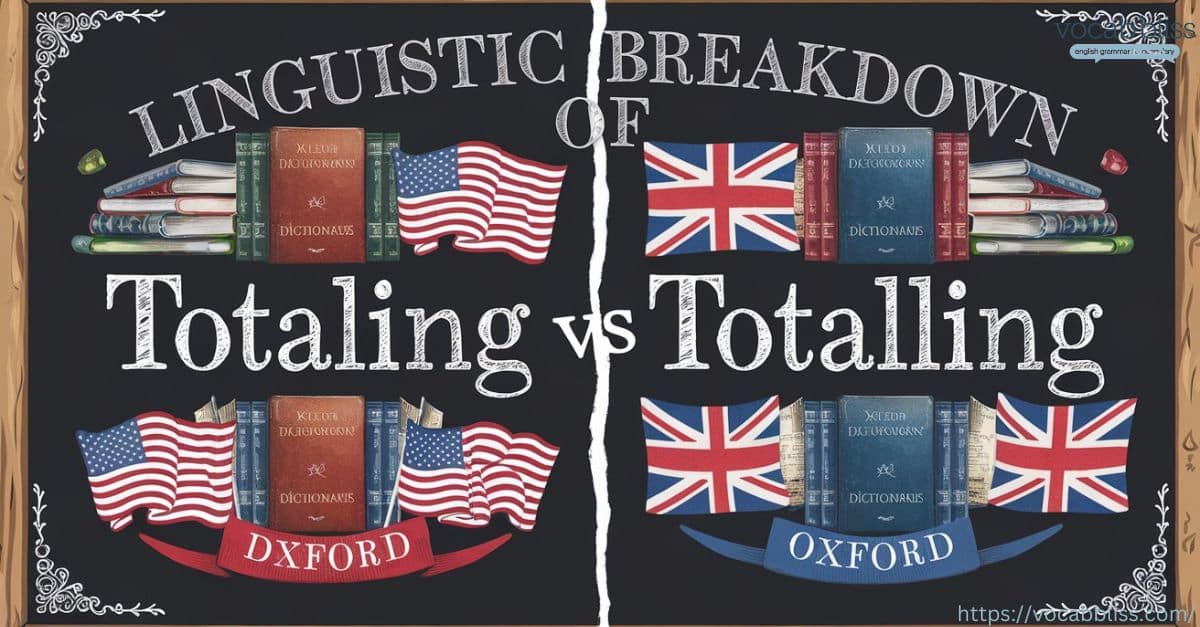
The word total transforms differently in each English variant due to regional language norms for adding suffixes to verbs. The British English spelling doubles the final consonant (in this case, the “l”) when adding “-ing,” resulting in “totalling.” In American English, the spelling remains simpler with a single “l,” forming “totaling.”
Grammatical Reasoning Behind the Spelling Variations
In English, verbs with a consonant-vowel-consonant (CVC) pattern often follow spelling conventions that vary by region:
- In British English, the CVC pattern calls for doubling the consonant before adding suffixes like “-ing” and “-ed” in many cases, especially if the last syllable is stressed.
- In American English, the tendency is to avoid doubling the final consonant and simplify the word endings.
Quick Comparison Table
| Form | British English | American English | Example |
|---|---|---|---|
| -ing | Totalling | Totaling | “He’s totaling up the expenses.” |
| -ed | Totalled | Totaled | “She totaled everything yesterday.” |
By following these regional conventions, you maintain consistency in your writing, which is essential for professional reports, emails, and documentation.
The Origins of Spelling Variations: British vs American English
The differences between British and American English spellings date back to the early 20th century when spelling simplification efforts aimed to standardize language for easier learning and reading. Noah Webster, a prominent American lexicographer, was a key figure in this movement, advocating for simplified spelling as part of American English identity.
Historical Context
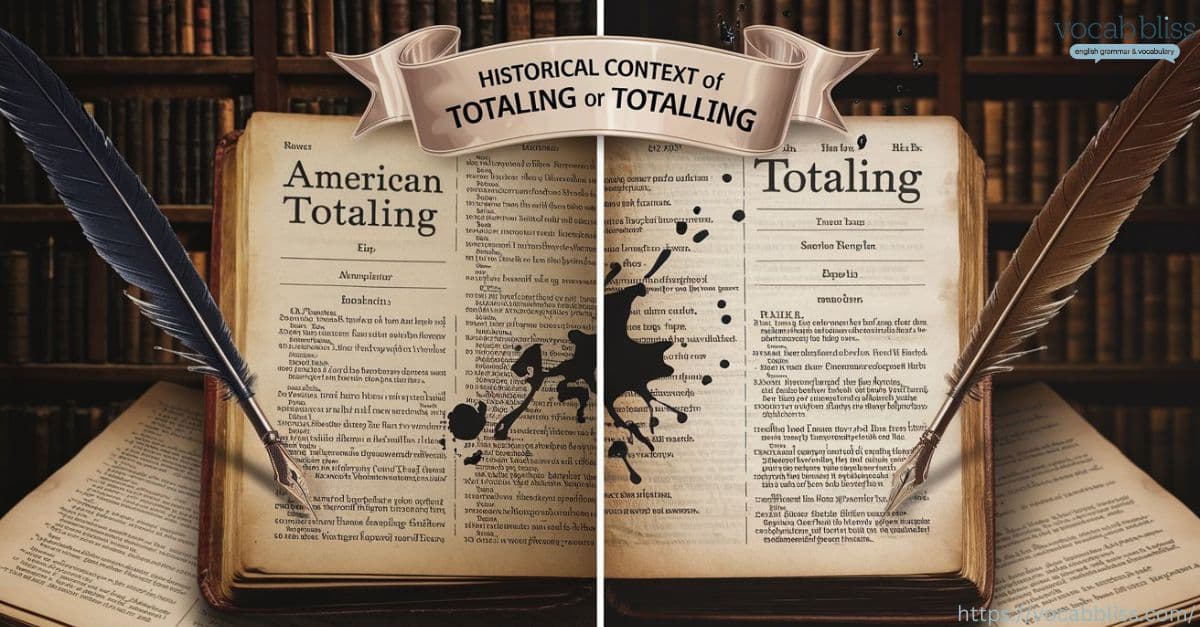
Noah Webster’s spelling reforms gave us the American versions of words like “color” (British “colour”), “center” (British “centre”), and “honor” (British “honour”). In verbs, this led to simplifications in continuous forms, like “modeling” (British “modelling”) and “totaling” (British “totalling”). This shift aimed to make English spelling logical, reducing silent letters and complex patterns.
Examples of Spelling Variations
| Word | British English | American English |
|---|---|---|
| Travelling | Travelling | Traveling |
| Modelling | Modelling | Modeling |
| Cancelled | Cancelled | Canceled |
| Labelled | Labelled | Labeled |
| Totalling | Totalling | Totaling |
These changes reflect distinct linguistic norms. American English prioritizes simplicity, while British English often maintains traditional forms. Understanding this history allows for clearer communication across audiences by respecting regional preferences in spelling.
Common Mistakes and Misconceptions with “Totaling vs Totalling”
Writers frequently encounter confusion when choosing between “totalling vs totaling” leading to common mistakes and misconceptions:
Common Misunderstandings
- Assuming Only One Form Is Correct: Both spellings are correct depending on the intended audience. British English readers expect “totalling,” while American English readers expect “totaling.”
- Thinking the Meaning Changes: Both forms retain the same meaning: adding up amounts or calculating totals.
- Inconsistent Spelling in Professional Writing: Spell checkers often default to American English, which can create inconsistency. For example, if you’re writing for a British audience, “totalling” should be used consistently throughout the document.
Avoiding Common Mistakes
To prevent inconsistent spelling and misunderstandings:
- Set your spell check preferences to match your target audience’s regional conventions.
- Use the same spelling throughout a document for consistency.
- Remember that both forms are correct, depending on your readers.
Quick Guide: When to Use “Totaling vs Totalling”
This quick guide offers straightforward rules to help you choose the correct spelling based on context and regional preferences.
| Audience or Region | Preferred Spelling |
|---|---|
| British English audience | Totalling |
| American English audience | Totaling |
| International/Neutral Audience | Choose one form and use consistently |
Tip: If you’re writing for an international audience, consider choosing one version (e.g., American or British) and apply it consistently throughout the document.
“Totallin or Totaling” in Everyday Use
In various professional settings like accounting, budgeting, and financial reporting, understanding the correct form is important. Here’s how totalling/totaling is used in different contexts:
- Accounting: Accountants often spend time totalling expenses for accurate financial records.
- Budgeting: For budget planning, totaling the figures across departments is essential for accuracy.
- Documentation: Professionals regularly write totalling/totaling in reports and documentation, ensuring consistency in spelling based on the audience.
Using the correct spelling in professional documents, such as financial statements, academic reports, or business proposals, can not only make a positive impression on readers but also significantly enhance your writing’s credibility.
Moreover, attention to detail in spelling reflects your professionalism and can help build trust with your audience. As a result, it’s essential to prioritize accurate spelling in any formal context.
Totalling or Totaling UK

In the UK, the correct spelling is “totalling” with a double “l.” British English follows a rule of doubling the final consonant when adding suffixes like “-ing” to verbs that end with a consonant-vowel-consonant (CVC) pattern, such as “total.”
This rule applies because the last syllable is stressed, resulting in “totalling” rather than “totaling.” While American English uses “totaling” with a single “l,” British writers and publications consistently prefer “totalling.” Using this spelling aligns with British English conventions, enhancing clarity and professionalism in UK-based documents and communication.
Related Forms: “Totaled vs Totalled”
As with the present participle forms, the past tense of “total” also varies by region:
| Form | British English | American English |
|---|---|---|
| Past Tense | Totalled | Totaled |
In British English, totalled spelling retains the double “l,” following the same CVC rule as “totalling.” In American English, however, the single “l” form totaled is used, maintaining spelling consistency.
Examples
- British English: “The team totalled the budget expenses before submitting the report.”
- American English: “They totaled the invoices to check for any discrepancies.”
The context in which these forms are used is important, as each region adheres to its own linguistic norms.
Spell Check Tips: Avoiding Mistakes with “Totalling Vs Totaling”
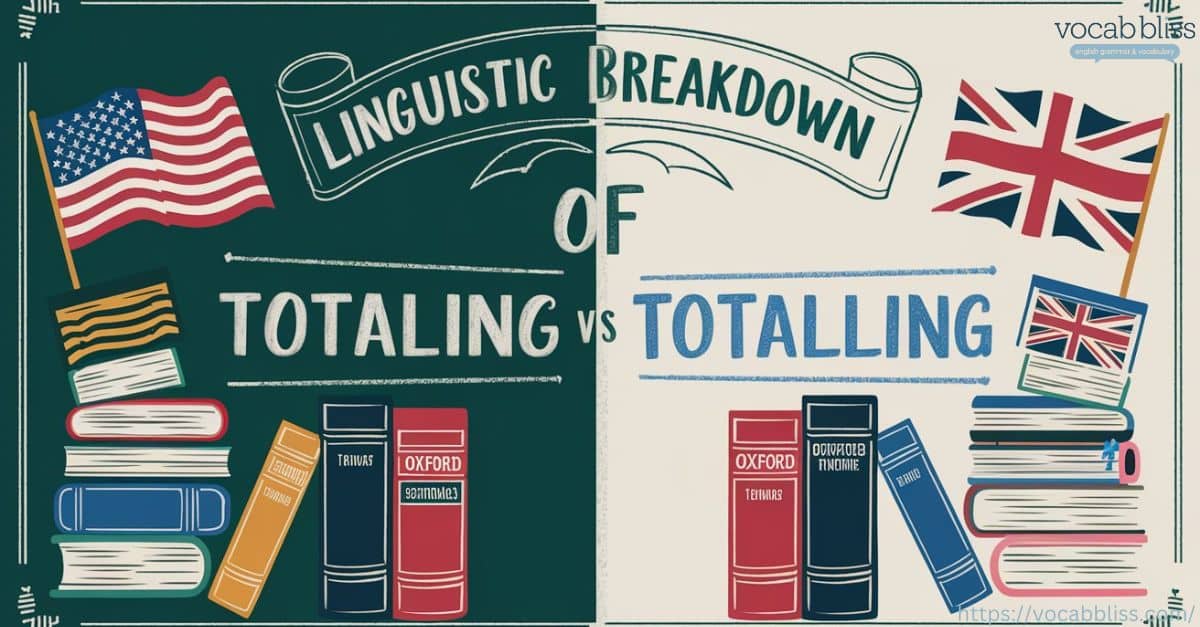
Here are a few spell-checking tips to help you maintain consistent spelling across your documents:
- Set Language Preferences: Configure your word processor for either British or American English to align with your audience’s spelling expectations.
- Consult Style Guides: Certain style guides, such as the AP Stylebook (American) or Oxford Style Manual (British), provide guidance on spelling conventions.
- Proofread for Consistency: Even with spell check, always review documents for consistent usage, especially if switching between regions.
These spell-check tips help ensure that your writing aligns with the correct regional spelling conventions.
Synonyms for “Totaling or Totalling”
If you’re looking to vary your language or avoid potential spelling inconsistencies, here are synonyms that convey similar meanings to “totalling” and “totaling”:
Adding up
- Calculating
- Summing
- Counting
- Tabulating
- Aggregating
Using synonyms can help you maintain a professional tone without needing to choose between regional spelling forms.
Using “Totaling or Totalling” in Sentences
Below are practical sentence examples demonstrating both “totalling” (British) and “totaling” (American), helping reinforce correct usage.
Examples of “Totalling” in British English
- “After totalling the expenses, they discovered an overspend in the budget.”
- “The accountant is totalling each item for the quarterly report.”
Examples of “Totaling” in American English
- “She is totaling the expenses for the monthly review.”
- “They are totaling the figures to ensure no category was overlooked.”
These examples clarify how linguistic norms impact spelling choice based on the audience and region.
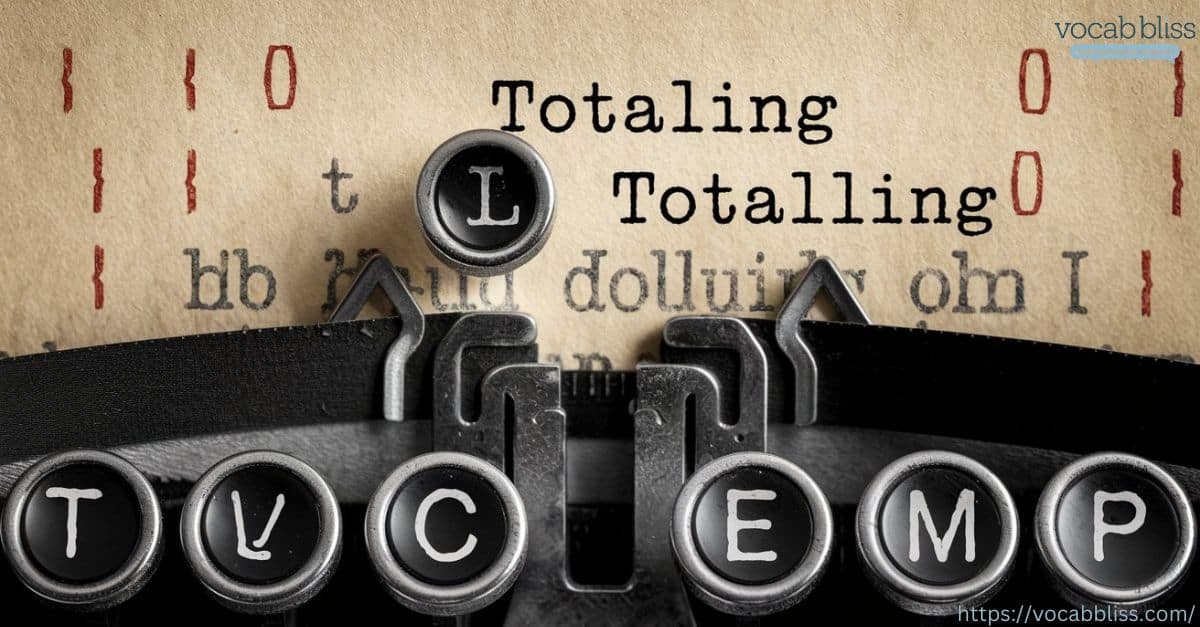
Totalled vs Totaled
The choice between “totaled or totalled” comes down to regional spelling conventions in British and American English. Here’s a look at the differences and when to use each form.
Totalled vs Totaled: Understanding the Difference
- Totalled: This spelling, with a double “l,” is standard in British English. British spelling conventions typically double the final consonant when adding suffixes to verbs ending in a consonant-vowel-consonant (CVC) pattern, especially if the last syllable is stressed.
- Totaled: Here’s the paragraph with added transition words:
- The American English spelling uses a single “l.” This is because American English often favors simpler spellings. Additionally, it tends not to double the final consonant in similar cases.
Examples
- British English: “The accountant totalled all expenses for the quarterly report.”
- American English: “She totaled the budget for the project.”
Quick Comparison Table “totalled or totaled”
| Spelling | Region | Example Sentence |
|---|---|---|
| Totalled | British English | “The finance team totalled the figures accurately.” |
| Totaled | American English | “He totaled his hours for the timesheet submission.” |
How Do You Spell Totaled?
The correct spelling of “totaled” varies depending on whether you’re using American English or British English conventions.
- American English: Totaled (with a single “l”)
- British English: Totalled (with a double “l”)
Examples in Sentences
- American English: “She totaled the expenses for the report.”
- British English: “She totalled the expenses for the report.”
Both spellings are correct, but choosing the right one depends on your audience or the regional style guide you’re following.
A Final Look: Choosing Between “Totalling” and “Totaling”
Whether you use “totalling” or “totaling” depends entirely on your intended audience and region. If you’re writing for a British English audience, “totalling” is the appropriate form. Conversely, for an American English audience, use “totaling.”
Here’s a summary:
- British English: “Totalling” and “Totalled”
- American English: “Totaling” and “Totaled”
Choosing the correct form and maintaining consistency throughout your work reflects professionalism and attention to detail, especially in professional writing, academic work, and financial documentation.
Understanding when to use totalling vs. totaling is a valuable tool in business, accounting, and international communication. By following regional spelling preferences and maintaining a clear writing style, you can communicate confidently with readers from around the world.

